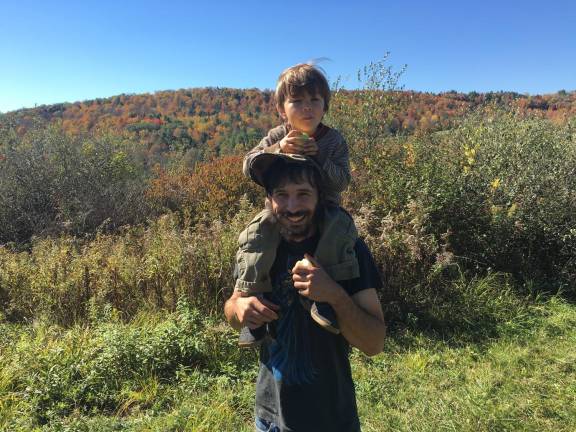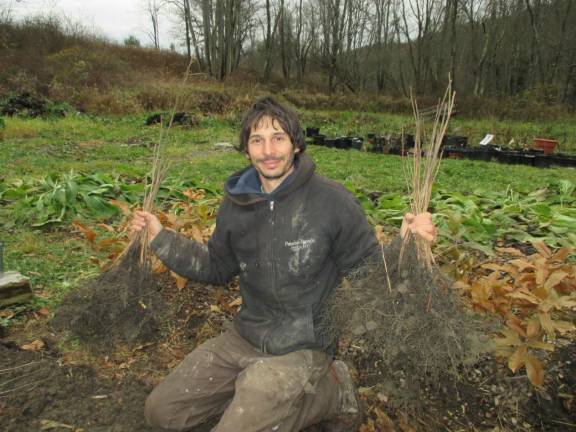Nuts 4 nuts
Our best piece of carbon capture technology also rains food down upon our heads. Akiva Silver believes that trees can still save us.


The author of Trees of Power and founder of Twisted Tree Farm, a 20-acre tree nursery, doesn’t want to simply wreck the world slower. He wants to flip the equation around altogether.
You didn’t grow up running around collecting nuts in the woods.
I grew up in Rochester, NY, just a normal, go-to-public-school, suburban childhood. And you know, nobody grew anything, that I knew of. I guess my grandpa grew a few vegetables. Nobody shot animals, nobody hunted, nobody foraged – ever. I didn’t even hear of those things until I was in my 20s.
Your self-education included these survival campouts, which sound pretty hardcore. You were often wet and cold and on the verge of being really hungry. Slash starving.
Yeah almost every time. [Laughs.] I was always really hungry.
Can you paint a picture?
I would say alright, I’m going to go for five days or 10 days or three days or whatever, and then I would just make different rules for myself for each one. Some of them I would bring no food. Some I would bring food for the first day. Some I would bring a cooking pot. Some I would bring a knife. Some of them I would bring nothing, and just see what I could do. Those campouts would be where I really learned the most. It’s like if you want to learn another language, you can go to Spanish class. Or if you go to Mexico and you live in some village where nobody speaks English, it’s an immersion. It was like deep immersion into nature. You’ll learn so much in a week, it’s amazing.
When you started gathering your own food from nature, you were struck by how much you had to take. You say: “I killed constantly to feed myself the bodies of plants and animals.” You felt guilty – then something changed. Describe that change.
It changed right away. You can’t really sustain yourself on guilt, but you can sustain yourself on gratitude. I don’t know, I think I was surprised at how much I consumed as a human, how much it actually takes for me to not feel super hungry. It’s a lot of life. I just decided, I am not going to apologize. When I kill something I’m not going to apologize, that’s just lame. I’m going to start saying thank you instead. Thank you for life. Because when you’re taking life to feed your own and you’re aware of it, then you suddenly don’t want to waste your life, you know? You don’t want to waste it being a complaining apologizer. You’re like, wow, I’m taking all of this, it’s really precious, and you feel like you really want to appreciate the life that you have.
The environmental movement is largely focused, as you put it, on wrecking the world slower. Talk about how we can actually make it better.
Whatever issues you’re working on, there’s always a way to slow the damage. For example, for climate change, well let’s burn less fossil fuels. You’re still doing it, you’re just doing it at a slower pace. Or we’re destroying the monarch population, so if we want to slow it down, they’re still gonna go extinct.
It’s more exciting to be like well, let’s reverse this effect, let’s completely flip it around. For climate change, instead of being like let’s burn less fossil fuels, it’s more about, let’s pull carbon out of the sky. Instead of trying to limit how much we’re putting up there, let’s understand we’re part of this carbon cycle and let’s start working with plants to pull it back down. Or for monarchs, it’s not like, let’s use less pesticides that are killing them, let’s actually not use those pesticides but also, let’s plant huge wildflower gardens and let’s change our agricultural approaches that are eliminating their habitat. Let’s start growing food that also grows monarch habitat. It’s more about being the change you want to see, rather than just doing what you feel guilty about a little bit less.
To readers pondering a career, make the case for working with trees.
There’s a huge, enormous market for trees, especially edible and native trees these days, it’s phenomenal. And no nursery is meeting the demands. It’s not even close. I sell out of all my trees every single year, right away, no matter how many I grow. I have requests from individuals for more trees than I even grow. There’s people requesting 10,000 chestnut trees a year from me. And I’m not able to provide that many.
That’s one way to work with trees. Another way is to harvest what comes off them, and to process them into easily consumable foods. For example, I’m working with a coop called the NY Tree Crops Alliance. This fall we’re going to be harvesting these hickory nuts and processing them into oil, and we’re going to bottle it and sell it in stores.
You could be collecting wild mulberries and drying them and selling bags of dried mulberries. People collect acorns and leach them, and make them into flour and make paleo cookies. You can be as creative with it as you want. There’s just a ridiculous amount of opportunities falling from the tips of all these branches.
Of the 10 "power trees" in your book, the first is the chestnut, which you call the manna tree. Why?
‘Cause they are. They’re bread trees. They basically make bread, and it falls right out of the sky. Chestnuts are a carbohydrate, they have the same nutritional equivalent as brown rice, and they can be used in at least as many ways as rice – or corn, or wheat. They can be eaten as a roasted nut, or they can be dried and ground into flour, and used in just every kind of baked good, stuffings, you can use them as soup fixers, you can use them in stews, everything from cookies to granola bars to oatmeal to cake. They’re a staple food, the way I think of them. It’s a staple food, but it’s falling out of the sky, onto your head.
You suggest that farmers move from growing corn to growing chestnuts. Do you know any farmers who have done that?
I know many, many people that have planted lots of chestnut trees at large and small scales, but I don’t know any mainstream row crop farmers that have switched. But that doesn’t mean they’re not there. I don’t know any GMO corn guys who have just switched over to chestnuts. But maybe they will after this interview.
You often work while parenting – three boys, 9, 7 and 4. Does that get crazy?
They help sometimes. And sometimes it’s crazy. My wife and I separated, so I have the kids half the week. When I have to get things done, I generally just try and focus when they’re not here. They used to be here all the time. It was always a juggling act. They like doing certain things. The problem is for it to be a business, a lot of times those things that they would like: planting, digging trees or collecting chestnuts or something, it would be fun for the first hour or two, but If you need to be doing something for 7 hours, or 10 hours, or for two weeks – they’re kids, they don’t want to do it the whole time.
You mention an exercise you do, where you sit completely still for hours in nature, which you say is good for the soul though there are stretches of boredom that are hard to endure. Do you still do this?
I don’t do it as much as I used to, now that I have kids my life is really different. But I still go hunting. So when I hunt I’ll sit like that whenever I go out, and that’ll be like two-, three-hour stretches. It’s nice, you just kind of tuck yourself in. You don’t have to be perfectly still, but just tuck yourself in so that you’re not really noticed by the birds and all the mammals. Then after like 20 minutes or so, things start to forget that you showed up, and they start to come out. It takes time, but they will come out, and they’ll be all around you and you can have pretty magical experiences.
It’s pretty cool to see animals when they don’t see you. And you get to see how they actually move and what their attitude is. Not their attitude when they see a person and they’re like, what do I do, they’re frozen or they’re jumping and running. But to see them as they actually meander through the woods is a deep lesson to see.
I used it do it twice a day. I probably did it twice a day for 12 years, every day, morning and evening. It was the best. But now I, you know, I’m more like an old guy I guess. I run a business, I pay a mortgage and I have three kids, and I don’t have that kind of time anymore.
Akiva Silver is the author of Trees of Power (2019), and founder of Twisted Tree Farm, a 20-acre tree nursery in upstate NY.